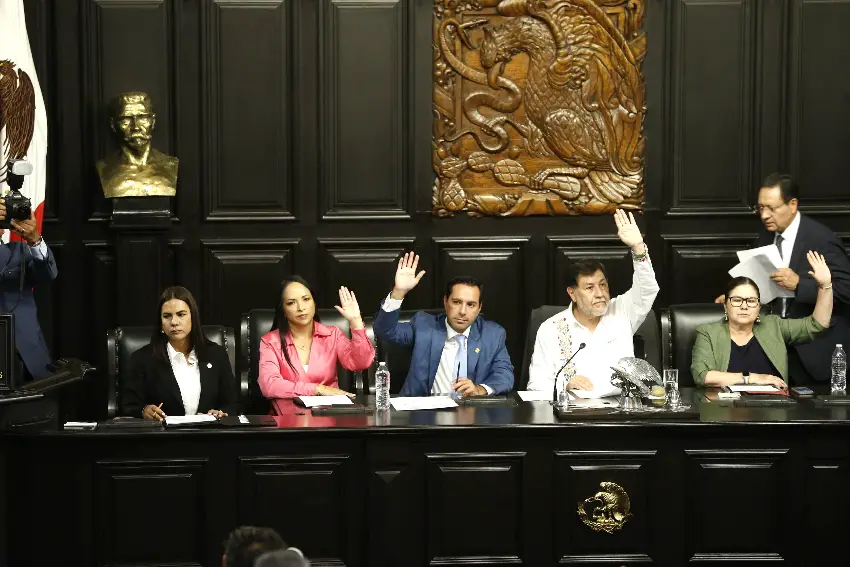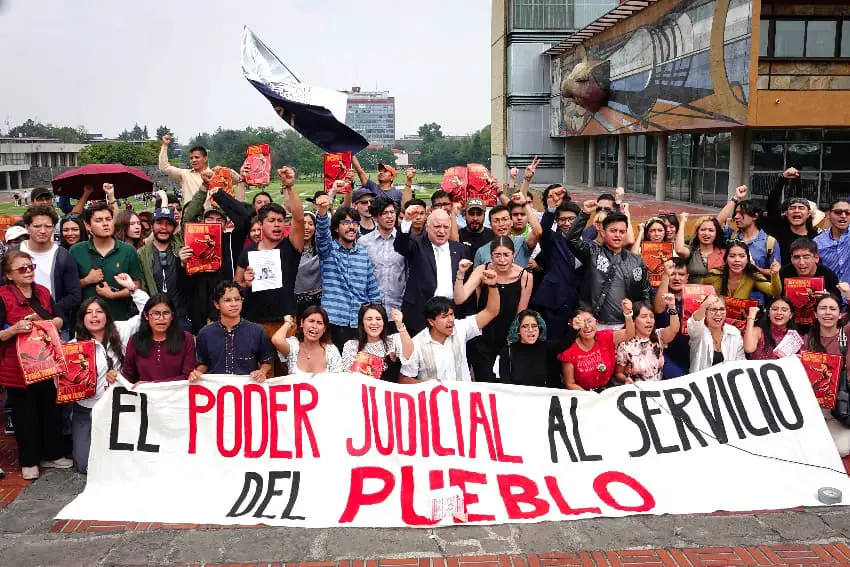Mexican Senate opposition unites against judicial reform

With the ruling Morena party and its allies just one vote short of a supermajority in the Mexican Senate, all 43 opposition senators are under pressure from court workers and others to vote against the government’s judicial reform proposal in order to prevent the constitutional changes it seeks.
The opposition senators, representatives of the National Action Party (PAN), the Institutional Revolutionary Party (PRI) and Citizens Movement (MC), are also under pressure from the reform’s architect, President Andrés Manuel López Obrador, who on Friday called on them to support the initiative that, if approved, would allow Mexican citizens to elect Supreme Court justices and other judges.
The 128 senators are expected to vote on the judicial reform next week after lawmakers in the Chamber of Deputies approved it on Wednesday.
Judicial reform puts a spotlight on the Mexican Senate
Senate President Gerardo Fernández Noroña, a Morena senator, claimed on Wednesday that the ruling party coalition has already secured the two-thirds majority required to approve the constitutional bill.
However, all 43 opposition senators have publicly committed to voting against the reform.

The national leader of the PRI, Alejandro Moreno, said Friday that Mexico’s 43 opposition senators are “firm” in their decision to not support the judicial reform. He declared that it won’t pass the Senate.
Two days earlier, Fernández Noroña asserted that a two-thirds majority in the Senate is “guaranteed” for Morena, the Labor Party and the Ecological Green Party of Mexico, even though the number of seats they hold in the 128-member Senate — 85 — is one below the supermajority threshold.
“I would say that we even have a surplus [of support], but you’ll see on the day of the vote. I believe we’ll be above the two-thirds [majority],” he said without revealing which opposition senators would vote in favor of the judicial reform.
Court workers weigh in on the judicial reform
Court workers from various states have set up a protest camp outside the federal Senate building in Mexico City ahead of senators’ consideration of the judicial reform proposal.
On Friday, judicial workers also marched along Paseo de la Reforma to the Senate, located on the famous boulevard that leads into the historic center of the capital.
At the conclusion of the march, they called on the 43 opposition senators to resist the pressure they’re facing and stop the proposal López Obrador sent to Congress in February.


The court employees contended that it will affect their work conditions, and that it poses a threat to the separation of powers and democracy in Mexico, as United States Ambassador to Mexico Ken Salazar has claimed.
“This reform will have very serious consequences for our rights in all areas — social rights, political rights and also economic rights. That’s why we’re here,” Lucero de Alba, a judge from Tlaxcala, told the Reforma newspaper.
“This is a final call to our 43,” she said, referring to the opposition senators. “Our 43 have all our support.”
De Alba also sent a message to two senators who campaigned as representatives of the Democratic Revolution Party (PRD), but later decided to join Morena, putting the ruling party and its allies just one vote short of a highly-coveted supermajority.
“To the two [senators] from PRD we say that you still have the chance to return to the [right] path,” she said.
Protesters asserted that the direct election of judges from candidates nominated by the president, the Congress and the judicial branch will allow Morena to co-opt the judiciary, and thus control all three branches of government.
“The Senate of the Republic perhaps has the greatest responsibility of the past century,” said Ulises Camacho, a court worker from San Luis Potosí.
It can either “allow the republic to live or kill it with the stroke of a pen,” he said.
“We choose the republic, the separation of powers and judicial independence. That’s why we’re here,” Camacho said.


He and other protesting court workers argued that the reform will lead to the politicization of the judiciary as candidates in judicial elections will have to campaign for the positions they seek.
Critics of the reform contend that Morena — given its ample support among Mexicans as demonstrated in the recent elections — could stack the nation’s courts with justices and judges sympathetic to its political agenda, and thus remove an important check on executive and legislative power.
López Obrador, Morena’s founder, and President-elect Claudia Sheinbaum, his political protégé, have rejected claims that the judiciary will lose its independence. Instead, they argued, renewal is needed because Mexico’s justice system is currently plagued by corruption and other ills.
Among other objectives, the reform seeks to ensure that no judges earn more than the president, and to create a Tribunal of Judicial Discipline that could sanction and even fire judges for illegal or improper conduct.
AMLO: ‘The judicial power is rotten, invaded by corruption’
At his morning press conference on Friday, López Obrador called on senators to put “the interest of the nation” first and vote in favor of the judicial reform proposal.
“I’m seeing that there is a lot of pressure on legislators, I see that [businessman] Claudio X. González — who is like the boss of the mafia of power — … is openly telling senators to vote against the reform,” he said.
“I want to address senators, with complete respect, [to tell them] to act with independence, with freedom and to put the interest of the people and the interest of the nation ahead of personal interest, partisan interest,” said López Obrador, who has just 24 full days left in office.
He asserted that it is not in Mexico’s interests to “maintain a judicial power that is subjugated by crime.”


“The judicial power is rotten, invaded by corruption. It doesn’t impart justice for the benefit of the people of Mexico. It is a power that is hijacked, taken, at the service of organized crime and white-collar crime,” said the president, who has been angered by court decision against his government’s policies and projects.
“It’s a power for the [elite and criminal] minorities, that’s more than proven. Although there are exceptions, corrupt judges, magistrates and justices dominate. It’s not possible to defend that,” he said.
“Why not bet on renewing the judicial power, cleaning it of corruption, purifying it so that there is an authentic rule of law?” López Obrador asked opposition senators.
“Are you going to continue defending foreign companies that come to loot, to steal, to affect the economy of Mexicans? Are you going to keep representing those interests?” he continued.
A reporter asked López Obrador about the possibility of the Supreme Court issuing a ruling that prevents the Congress from considering the judicial reform, a course of action that Chief Justice Norma Piña has sought advice on from her colleagues.
“It would be an aberration and of course a flagrant violation of the constitution to stop the process of analysis, debate and approval of the constitutional reform, as the case may be,” he said.
“… There is no constitutional foundation, it would be an arbitrary act, and this would affect public life, of course it would affect what should be an authentic rule of law. It would be like opting for the law of the jungle,” López Obrador said.
‘Judicial power by popular vote!’
It’s not just people opposed to the judicial reform proposal who have taken to the streets — some of those in favor of the initiative have as well.


On Thursday, thousands of public and private university students gathered outside the Supreme Court in the historic center of Mexico City to demonstrate their support for the constitutional bill.
Among the chants they shouted were:
- “Judicial power by popular vote!”
- “Judicial reform, national priority!”
- “Judicial power, national shame!”
Camilo Villareal, a student who spoke at the demonstration, said that the “excellent conditions” that currently favor the approval of the reform — i.e. Morena’s strong majority in both houses of Congress — are “the result of the sovereign decision” Mexican citizens took at the ballot box on June 2.
A majority of people voted in favor of “the transformations the country demands — deep transformations, not simulated ones,” he said.
Luis Flores, a history student at the National Autonomous University, told the La Jornada newspaper that the election of judges by the people is a “necessity.”
He noted that citizens already elect lawmakers and the president, and asserted that another essential part of the “democratic system” is electing judges.
Rafael Barajas, a cartoonist, writer and left-wing political activist, also spoke at the demonstration outside Mexico’s highest court.
“This Supreme Court recently struck down 74 laws [approved by] the Congress, violating the principle of the separation of powers,” he said, noting that one of the laws it ruled against was the Electricity Industry Law, which favored the state-owned Federal Electricity Commission over private companies.
The conflicting views expressed by Mexicans from a range of walks of life are indicative of polarization within society over the judicial reform.
One recent poll found that 52% of more than 1,000 business leaders supported the reform, while 48% opposed it.
Another poll of ordinary citizens found 45% support for the reform and 24% opposition, with the remainder either neutral or declining to offer an opinion. Curiously, the same poll detected 54% support for the appointment of judges and 42% support for their popular election.
With reports from Reforma, La Jornada, Expansión Política, Aristegui Noticias, El Financiero and Milenio
Source: Mexico News Daily

